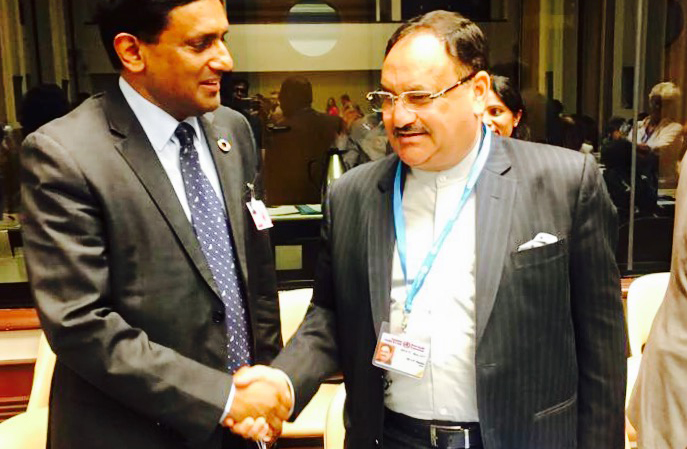September 5, Dhaka: The Ministry of Health and Family Welfare of the Government of India has launched two new contraceptives – an injectable contraceptive Medroxyprogesterone Acetate (MPA) named Antara and a contraceptive pill, Chhaya in the public health system. These would help expand the basket of contraceptive choices to address the unmet contraceptive needs of couples.
Dr. Joe Thomas, the Executive Director of Partners in Population and Development, an intergovernmental organization of 26 countries committed to promote family planning and reproductive health issues among developing countries commented on the Government of India’s initiative to address unmet contraceptive needs. “Honorable Health Minister Mr. J. P. Nadda must be congratulated for his efforts in expanding the basket of contraceptive choices to address the unmet contraceptive needs”, said Dr. Thomas. “India may also take efforts to provide contraceptives as part of its bilateral assistance to other developing countries”, added Dr. Thomas. H.E. J. P. Nadda, the Minister for Health and Family Welfare of the Government of India is the Vice Chair of the PPD Board of Directors.
The two contraceptives Antara and Chhaya have been launched in the 10 states of Maharashtra, Uttar Pradesh, Madhya Pradesh, Rajasthan, Karnataka, Haryana, West Bengal, Odisha, Delhi and Goa. They are available for free in Medical Colleges and District Hospitals.
According to several studies, these contraceptives are safe and highly effective. The ‘Antara’ injectable being effective for three months and the ‘Chayya’ pill for one week, will help meet the changing needs of couples and help women plan and space their pregnancies.
Training of healthcare practitioners from all the states has been completed, with a pool of state and district level doctors and staff nurses being trained to support the roll-out. The Health and Family Welfare Ministry has recently launched a software – Family Planning Logistics Management Information System (FP-LMIS) – designed to provide robust information on the demand and distribution of contraceptives to health facilities and ASHAs. This in turn would help improve the supply and distribution of contraceptives.
World Population day on 11 July 2017 saw the launch of ‘Mission Parivar Vikas’, a central family planning initiative by the Minister, H.E. J. P. Nadda on World Population Day. Mission Parivar Vikas focuses on 146 districts in
7 states with high Total Fertility Rates (TFR). The key strategic focus of this initiative is on improving access to contraceptives through delivering assured services, ensuring commodity security and accelerating access to high quality family planning services. The mission is being implemented in 146 high focus districts with the highest TFRs in the country. These districts are in the seven states of Uttar Pradesh, Bihar, Madhya Pradesh, Rajasthan, Jharkhand, Chhattisgarh and Assam that constitute 44% of the country’s population.
It is expected that Mission Parivar Vikas will promote in reducing TFR to 2.1 by the year 2025. According to the Sample Registration System (SRS) Statistical Report 2013 the national level TFR was 2.3. There is a wide TFR variation between the states of India. Kerala state has the lowest TFR of 1.8, Bihar state has 3.4 and Utter Pradesh has 3.1.
The Ministry of Health and Family Welfare, through its sustained family planning efforts, aims to achieve its goal of increasing modern contraceptive usage and ensure that 74% of the demand for modern contraceptives is satisfied by 2020, with continued emphasis on delivering assured services, generating demand and bridging supply gaps. The Ministry’s focus remains on increasing awareness and demand through a holistic communications campaign that has simultaneously been rolled out across all states of India.
“Family planning in developing countries is a key development enabler. Expanding family planning choices is an investment in women’s empowerment and economic opportunities. Promoting cooperation and partnership between the Global South is essential for achieving family planning related Sustainable Development Goals”, Dr. Thomas concluded.


Leave a Reply
You must be logged in to post a comment.